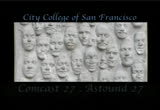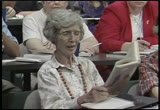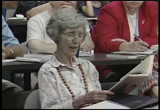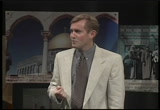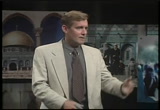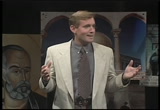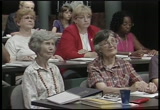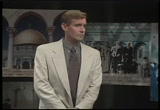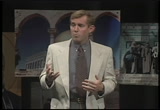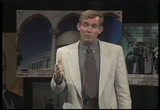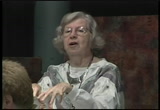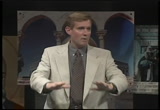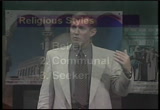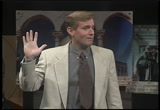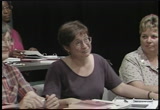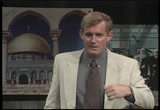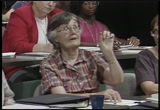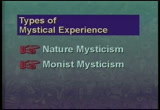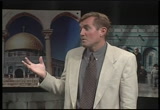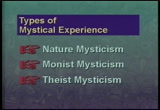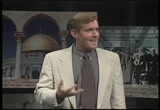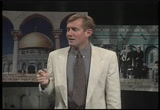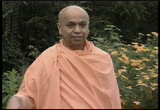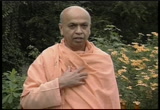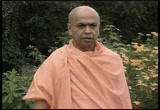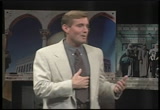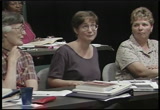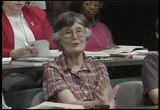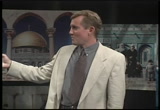tv Al Jazeera World News LINKTV February 20, 2013 7:00pm-7:30pm PST
7:00 pm
welcome to another session of beliefs and believers. i'm dr. john simmons, and we are moving through the experiential dimension. today, as usual, we've got some very interesting classes on mystics and meditation, because we're looking at different types of mystical experience. but what i'd like to do is something we've had a good time doing and i like to do throughout the semester is what i like to call b & b sightings. we've talked about identity and relationship and boundary questions and rites of passage.
7:01 pm
are you folks beginning to see it out there in the world around you? any religious experience type things that you've gone through that you'd like to share with us to start out? yeah, sure. >> it just leapt out of a book that i was reading - a spiritual experience. it's called, two against the sahara. >> i'll bet you just happen to have that ready to read. >> i happen to have it ready to read. >> isn't she amazing? well, fire away. i'd like to hear it. >> these two, the husband and wife, who were newlyweds are walking across the sahara desert, and they've gone - well, with camels - and they've gone 3,000 miles. and you can imagine the hardship and the joy and everything that goes along with that. anyway, "we moved on through sunset. a cold breeze chased away the last shreds of heat. the sun sank into a net of translucent clouds, like angry scratches on the sky's belly. in a moment, it appeared to balanced uncertainly on the edge of the dunes.
7:02 pm
i felt suddenly the tiny planet we were traveling on - an umbilicus bound us to it. it was not separate from us; we were as much manifestations of the earth as the rocks and the sand, the grass and the trees, the insects and the birds, the clouds and the rain. our ancestry ran back into the unfathomable ages, through branches and junctions of the tree, and down into the tap root of the mother plant. from this moment, our kind was spread out into the future, through more billions of branches, plugging into eternity, colonizing the distant time to come. but the earth was the mother of all. such feelings came to me often, together with a deep sense of the unity of everything around me. it was primitive, even pagan. or perhaps i was only relearning what i and everyone else had always known.
7:03 pm
i can only say that these intense feelings of the oneness of nature, were the nearest of genuine religious experience that i had ever come." >> now, that is beautiful, and folks, if we really were doing television right, i would have saved that very piece for our look at nature mysticism. we don't have a spokesperson for nature mysticism in this class, but when we come to that note, i want to go right back to it, because it's a wonderful expression of what we call nature mysticism - that feeling of oneness. and we'll also listen to bishop thomas, a coptic orthodox monk in this class, who speaks about the tree, and the branches of the tree, and there it is, synchronicity. very beautiful. other experiences you might have had that illustrate class themes over the past week and you all want to share. sure. >> i attended a funeral of a parishioner in our church, and it was divided between
7:04 pm
the religious ceremony, after which our two pastors were seated, and then there was a ceremony by the legionnaires, and it was so moving. there were about a dozen legionnaires that each had a few words to say about the deceased, and then each of them marched to the front of the church and saluted and said, "good-bye, fellow legionnaire," and it was so moving. both flags, the american flag and the church flag, were up front, and it was such a beautiful blend of ritual. >> so you see, rites of passage, identity, legionnaire, sense of oneness,
7:05 pm
sense of bringing that in at a time, a difficult time like a funeral that's so true. speaking of a funeral, my eleven-year-old daughter, her little bird mikey, who she loved and had lived a good, long life, died, lilly's bird. and it was so sad. she took the bird and put it in a little check box for - a coffin; the kind of thing that checks come in - she put it in that, and we tried - we were moved, she was moved to develop some kind of symbolism. and she did one thing that just brought tears to my eyes - she took a little piece of her hair and she cut it off and put it in the box with the bird, and we went out back and we dug a hole and put it in the hole, and there went mikey. but without any specific kind of religious sense, we were called upon to do it. yeah, virginia. >> you're saying that - isn't that marvelous? when you think that the egyptians, the chinese, with their soldiers, and in ceramic form,
7:06 pm
when they passed, they took everything with them that would ease them into the next, because most people don't say they died, they say "passing on." passing on. and this idea that death, we've said is the great generator of boundary questions this idea of death that, for some reason, the society - this one shot, one time-boom, it's over. but there's a sense of passing on, and i think lilly wanted to give mikey something of herself - she put other things in there in the little coffin, and we put this stuff so that mikey could pass on and take that along with her. and to see that instinctively come out of a child without any particular religious significance, but the understanding that a rite of passage deserves some kind of symbolic statement. now we're going to be talking about ritual, of course, later in the course, but that's the key idea. >> on public television last night,
7:07 pm
there was a one-hour program about cardinal bernadine, and how he viewed death as his friend and enabled all of those of us who watched through his declining and death how to do it with grace. >> grace and dignity, yes. he was the great - what was he, the cardinal of chicago and a gentleman of obviously great spiritual integrity, and he taught through his own demise, which was certainly well documented in the chicago papers, just what you're saying, the dignity that one should go through. yes, susanna? >> also a point that he made, and in a book that he succeeded in writing before he died, was it's just amazing how clear your priorities get when you know your time is limited, when you can almost count your days. it's a great blessing to know that, i think, because then you can say your good-byes, you can use your time
7:08 pm
to have things in order. you can do so many things. and his priorities didn't shift greatly, i don't think, but he weighted them differently. and his funeral attests to the fact that he was truly a man committed to - he was a seeker in his way. there were not just catholic people who were there or who even had services at the time he died - there was a jewish service there; there were many different kinds of religious, cultural, ethnic things that took place - each of those traditions coming to honor this man who they looked at as a brother. >> and i like your use of the seeker style. in fact, that might be a good place to go into our look at mystics and mysticism. if we could bring up one graphic from the last class, obviously, a cardinal in the roman catholic faith is someone you would say immediately is the belief style of religion, but you're so right, susanna, that all the styles were embodied in that man, and he was certainly a seeker.
7:09 pm
in fact, i had a wonderful conversation with martin marty, who that he had a chance to meet the great religious people of the world - the dalai lama, the pope, other great religious leaders - and he said that every one, they go so deeply into their own tradition, that they can find connection with other traditions. and our swami that we'll meet in the next class is exactly like that also, because he sees all religious paths as leading to a similar summit. not everybody agrees with that, yeah, you want to follow-up, susanna? >> well, i was just going to say, truly, you may have hit on it, that the deeper you go, the more you recognize. and his roots were down, and you could see there were other ones there, sort of mixing in with yours, but there is a connection. >> i love the root comment, and we want to stay with the root comment here in your beautiful piece you read to us. and also listen to what our bishop thomas, the coptic bishop, has to say about roots - so it's very much with us. helen, let me get your comments, and then we'll do these graphics. >> i have a book by christopher mayhew called, men seeking god - he did a television series
7:10 pm
on comparative religion for the bbc about 20 years ago, and he went on interviewing religious leaders. and the main point that i got, that i learned from this book, is that all of the different religions, if you talk about the doctrinal level and the theological level, you find tremendous opposition and diversity. but when you speak to the mystics of each group, it seems as if they all sound pretty much alike. when the mystic goes into a trance, or whatever, and comes back, they usually all say the same things - that we should love each other and forgive each other, live in harmony, and so forth. >> and not bad ideas. >> mysticism - the deeper we go - excuse, let me just finish this, following up on what you said. the deeper we go into any tradition, the more similar the mystical experience may be. i don't know if that's true or not, but that's what i got from that book. >> well, and thank you so much for sharing that, because it's one of the key ideas, i think, when we look at mystical experience,
7:11 pm
which we will today, at a meditation, and listen to people who do this. we will go to a monastery out in the desert in egypt, where the real commitment to the monastic mystical life is there. but it's as you say. in our next class, ramakrishna, who started the dante school, says something so similar. he says in the foothills, beneath the mountains, people struggle and argue and there's great differences in theology and ritual and myth, and there's a lot of disagreement. but as you get out of the foothills and then begin to go further and further up the mountain, to the peak, as you say, helen, that - and the mystics say - you find a oneness, a unity. and it's only experiential - most of us stay down with the belief style, perhaps - we're more there in the communal style, we're down in the foothills. but to listen to the great mystics, which we better get listening if we're going to get to it in here - but i love this stuff, i mean, it's so much fun. but yeah, you listen to what they have to say,
7:12 pm
and we'll hear that today - half a world away, in egypt. then we'll go to san francisco, i guess, and then - well, no, in this class, also we'll talk to the dante hindu swami, says the same thing. and, we've heard it before and we'll hear it again and again in this class. but just quickly, down through the - this is a reminder. we have these graphics. we've got the belief style, we've got the communal style, and we talked about that, that people belong to religious organizations because it's family, it's belonging, it's the apart and a part idea, we want to belong. but the one we want to pick up on in particular that, we're getting a lot of synchronicity in this class, which susanna brought up about cardinal bernadine, is the seeker style. and i really want to make that point again that these are not mutually exclusive. when i've met religious people and get to know them a little bit, i find most of them embody all three. you've got to have something to believe in - that's why we have religious organizations - you've gone to be down in the foothills or you can't get up the mountain.
7:13 pm
you've got to have a - well, not everybody, but usually a group must be there, a sense of belonging, a sense of connectedness or tradition. but it's the seeker style - the fact that boundary questions rise up, rites of passage rise up, and people need to probe and look and continue to grow. and it would be an interesting book - perhaps somebody's written it - but susanna's comment once again, that when you're a deeply religious person and those roots go deep, it almost prompts you to continue the seeking, and i think we'll see that. so let me run down through, quickly - fortunately, we have very grew graphics and lots of neat roll-ins in this class, but the graphics for this class are just the different types of mysticism. we do not have a spokekesperson, but - i correct myself. we just had a wonderful spokesperson in barbara and her intuitive passage - that is nature mysticism. a couple classes down the pike, on primal religion, we will have tom drift in, who's an ojibway indian,
7:14 pm
a native american from minnesota, and he will speak so eloquently of what we will call nature mysticism. these are the groups that embody a sense of oneness with nature. sure, janet? >> i have one kind of interesting little story that goes with this. my friend - i'm a biology teacher by trade - and my friend teaches biology in canada, and she has a mix of canadians and first nation people in her classes. >> first nation people - i like that. >> first nation people. on the first day of class, you have to decide what is alive and what is not alive. so she's got everything written up on the board - the students generate the list - they go through one by one, she comes to rock. she says, "alive or not alive?" people vote, "not alive," and one first nation girl raises her hand and she said, "oh, no. where i come from, the rocks are alive." >> and it's so interesting. you're right, because our native american visitor will speak to that issue. the rocks are alive - i've seen sweat lodge situations. the rocks are our ancestors - that's nature mysticism, the oneness. >> yeah, it just really made her
7:15 pm
think about things. >> and here again, we just talked about death, and in our culture, for the most part, death is like a one-shot deal, but at the same time, it's passing on. and someone was telling me that we have so many little aphorisms and sayings that indicate that we really do realize that - i don't know what this thing is made of, but it's alive; there's elements in there. even quantum physics tells us it's moving, and to honor that and have a sense of oneness with it, which your beautiful passage brought out, is really what we're talking about. but oneness is the key - unity. now, our swami will have a little trouble with oneness, because he says with oneness, it's like, well, we're so used to one, two, three, four, five - he prefers to say "not two," because then that gets us out of it. but we've talked about the quest for unity and the desire for unity as being one of those fundamentally
7:16 pm
religious impulses, and that's what's going on with nature mysticism. as we mentioned in the last class, probably 40 percent of the people in this room have had a nature mystical experience and may or may not know it - an overwhelming sense of completeness and wholeness with nature - that things are good, that you belong, you are connected. and these are just words coming out of my mouth, but those of you who have had one know what i'm talking about, i mean, you are home, with a capital h-o-m-e. yeah, sure? >> as you were talking, something came to me, and i don't know if you've brought it up before. but you were talking about apart and a part. that "at one" - when you've done something wrong, that you're apart, but then you atone - a-t-o-n-e; you atone, you bring it all together, and then you're part of the one again. at-onement - atonement. i never thought of that - right.
7:17 pm
>> wow, we're cooking today! yeah, that's - atonement. and of course - >> and that's when you have done something that makes you apart from that whole. >> that's right. and when we get to the ethical dimension, we'll talk about dissonance - you have done a behavior that makes you really apart, and guilt and negativity are part of that. and so how do you atone, how do you become harmonized again with the community, with yourself. so wonderful connections we're making in this class. so anyway, nature mysticism. the second one - and we don't have someone to talk about that, but we've talked very well about it. we do have someone to talk about the second one, which is monist mysticism - very common in varieties of hinduism and buddhism, and we look at hinduism, of course, in the next class. but monist mysticism is a sense of oneness with mind, with god, the godhead - depending on who's talking - the vedantin swami who we'll
7:18 pm
speak with here shortly will be our example, says it way better than i ever could. how is it different from nature mysticism? quite frankly, i just don't know how these ultimately experientially, these different kinds of mysticism are different. we're in the foothills of a college course, and so we're setting up these different types, and that's what i think of these three types of, as the foothills. because whether it's a native american shaman, a vedantin hindu, swami, or it's a coptic orthodox christian monk living in the deserts of egypt, i bet, as we've said in class already, they're getting very close to a similar experience of oneness, of completeness, of wholeness. and maybe we go with the swami and say "not twoness" - not twoness. the idea of being one with god, an interesting analogy may have come out of the ramakrishna school also - not all hindus - or not all people that seek oneness with god want that.
7:19 pm
i mean, some people don't want to be sugar; they'd like to taste sugar. so there's that little - could there possibly be a little space between the divine and - >> church on sunday. >> yeah, just a little something. and, it's a wonderful thing, because that's why with the intellect, it's almost impossible to grasp this kind of mystical oneness - it's an experiential thing. once there, these questions of, "am i sugar, or am i tasting sugar," are ludicrous; they just don't happen. but we're still in the foothills, so we'll trudge along. the third one - i mean, we have one of my favorite pieces that we, with great effort, accomplished, having gone past the pyramids and way out in the deserts, outside of cairo. we went to st. macarius monastery, and we had a chance to talk with - i mean, i've been to a few monasteries in the united states - there's chevy monasteries and there's cadillac monasteries, and this was an original monastery,
7:20 pm
and you just, you felt this. i mean, this is the spot where the monks were hanging out in the third century, in their little caves there, so we got in an immense tradition. so we'll have a chance to talk to someone who was connected over a millennia into that tradition out there in monasticism. but, as you can probably tell, i mean, i love these kind of - this part of the experiential dimension, because first off, if gallup has it right, the gallup poll, 40 percent of americans, and maybe even 50 percent of the british when they're not watching soccer, have mystical experiences. and so the idea here is, it's real, it's out there, and it exists inside of traditional religious organizations, but it also exists in that capacity, that impulse capacity that we talk about in terms of the experiential dimension - i mean, what makes people religious? well, in some senses, it has to do with this fact that we have these extraordinary experiences. so often we get stuck with
7:21 pm
religion in the belief style that, well, what do you believe and what does it do, and when we get to doctrine and ethics, we have to go through those. but i feel almost like a plumber, when we're in the doctrinal and the ethical dimension - we're just kind of putting pieces together and seeing how the plumbing works. when we're into the experiential and the mystical, it's just so real and mysterious and unusual that i really like this part of it. so why don't we do a roll-in, see what kind of interest that sparks. our first example - we'll put off our nature mysticism until we get to the native american, a couple classes hence, on primal religion. i like that, though - first nation, first nation person. i've got to keep up with these things. anyway, let's go to our roll-in, and here, it's in san francisco. we went to the vedanta center, - the vedanta school of hinduism is very much in the monist mystical tradition - this sense of oneness, or not twoness, as our swami says. and meditation -
7:22 pm
meditation is through so many disciplines, so many organized religions, so many belief styles. whether you want to call it prayer or meditation, meditation becomes a key way of engendering, or creating the mystical experience. so we'll also hear the swami talk a bit about meditation. so if we could, let's go to the vedanta center in san francisco. >> see, meditation has a great place in our spiritual practices and spiritual experiences. it is this. just as a scientist, i select the practical element from all the other, per se, compounds and impurities and all that, and this is the pure sample of that. so, here also, in meditation, god, our reality is thought of,
7:23 pm
and then meditated upon, or we can observe in god as he is, without any reference to any of the external world, of the people, or any of those things - just, it is. or, if you want, i am, and it is - that's all. just god and me - that experience - without any reference to anything. that is our mysticism - communion with god, just that. and with that as the background, or the starting point, come on, see god, everywhere and everything. otherwise, when you see god in everything, what are we looking for? that must be very clear. so only the mystics have a clear comprehension, one has the [inaudible]
7:24 pm
experience without anything else - just god. that is the state of meditation with just god. but there are two levels there. one is god in me - that is the imminent aspect of god. and the other world, transcend into, where there's no me and god - just god, just the spirit. that's called brahman - that's the place of meditation. >> and at that point, that's a sense of oneness - god everywhere. but not the me in there, but the god is in there. >> you see, this word oneness has some problems, because we are accustomed to one, two, three, four, five, six - it is one like that. if you want to get the comprehensive idea, you say "not two" - not two; without data. not two - that's all.
7:25 pm
afterwards, i don't know, because i am not there to talk about it; it has become one without the second. even that is a compromise. [inaudible] krishna, is to give an example. everything in this world has been defined by the tongue - by talking about it, thinking about it, but brahman has not. that means it is beyond talk and words and everything. >> isn't he a perfect swami? it's like we went to typecasting and got a swami and - but talk about being in the foothills. i'm looking at this guy and he's got a lot of compassion because he's dealing with me, but if he wasn't a swami, i'd think, where did they get this dumb religious studies schmuck - what are these questions. i mean, the guy's got this wisdom and knowledge and i'm asking about oneness and mystical experience. but i think i got the point from him, and it's that if you want to experience oneness,
7:26 pm
you can't just talk about it using words - you have got to meditate; you have got to do something that brings on the experience. and it's very, very real to him. i don't know if we have any meditators in here, well, janet, and then we'll go to virginia. go ahead. >> my meditation teacher used to say doing meditation is like swimming. suppose you're wanting to learn how to swim. you could read a book about swimming, you could go watch other people swim, you could go feel the water - "oh, it's wet!" but you're not going to learn how to swim unless you jump in and do it. so that's how he would talk about meditation. and then when we went to learn how to do it, he just gave us a little lesson and we just would sit. >> it's just so - you have to do it. i mean, i think about it in terms of - the students down at western illinois university are very down-to-earth and they come down there for practical majors, like law enforcement and technical majors and these sorts of things.
7:27 pm
and sometimes i walk around the humanities going, "what am i doing? why should anyone learn about religion? what good is it?" but then i pat myself on the back and say, "the humanities - you're learning about how to do life. and no matter what you do, whether you're a law enforcement person, a state trooper, a computer expert, a businessperson, whatever, maybe you'll take this religious studies class, and it'll all work better for you." and that's what i mean about the swimming part. >> the students of meditation, though, ask the same question college students would ask - "how long, guru gi, should i sit?" and he would say, "five minutes longer than you want to." >> yeah, that's the idea. virginia? >> i was just going to say that first of all, he's a wonderful ad. i mean, he is so serene - you look at him and you think, "i want that too!" >> absolutely. yeah. >> however, for me, the most difficult thing was letting the get past, "i really should be doing the laundry," or "i promised to call," and get into a state
7:28 pm
where that is all past; it's like now the screen is blank. but for me, it's color - washes of color, beautiful color - and that quietness shows me how much more there is inside than i give myself time to realize. it is so true what a little stillness would do, and it's so hard to find. i'll tell you the opposite. you want to see if you have trouble conceiving of meditating, let me give you the opposite - of total chaos, cacophony. last night, we were up here with my wife and my kids, and we went to chuck e. cheese. have you ever been there? can you imagine the swami, kind of walking through chuck e. cheese, if you've ever been there? my condolences if you have. but it's the opposite - we live in such a world of "d-e-e-e-e-e-e-e-e," and turning off that inner chatter is so very difficult.
7:29 pm
well, we're on a roll here, and susanna, i'll come back and get you. i want to move to our roll-in on theist mysticism, because as i said, it's one of my favorite and i want to make sure we get it in and have plenty of time to talk about both types. this is monist mysticism, with our swami, and you'll hear more of his mystical experience, because in the next class, we have a major our spokesperson for hinduism, and so we'll come back and visit him in the next class. but i want to go to our second roll-in, and as i've already mentioned, this would be theist mystical experience. and down in the foothills, once again, beneath the peak of mystical wonders, i believe this starts out more like what we call a numinous experience - in other words, there's a distinct difference. it's very typical of islam, of christianity - in this case, christianity, the coptic orthodox phase - typical, at some senses, in judaism, where you're here and you're so l
85 Views
IN COLLECTIONS
LinkTV Television Archive
Television Archive  Television Archive News Search Service
Television Archive News Search Service 
Uploaded by TV Archive on

 Live Music Archive
Live Music Archive Librivox Free Audio
Librivox Free Audio Metropolitan Museum
Metropolitan Museum Cleveland Museum of Art
Cleveland Museum of Art Internet Arcade
Internet Arcade Console Living Room
Console Living Room Books to Borrow
Books to Borrow Open Library
Open Library TV News
TV News Understanding 9/11
Understanding 9/11